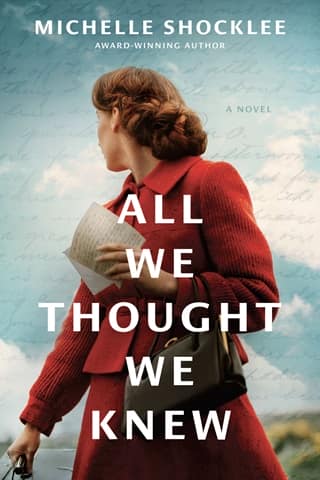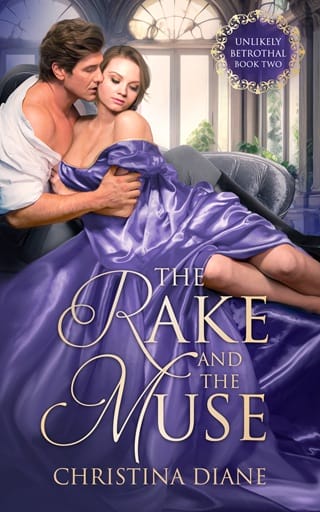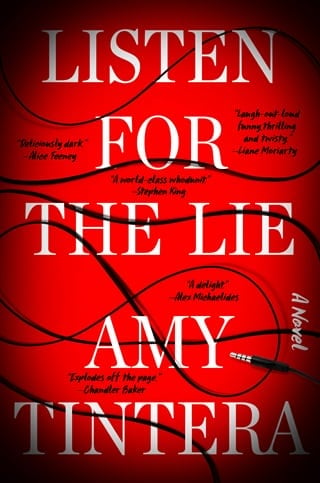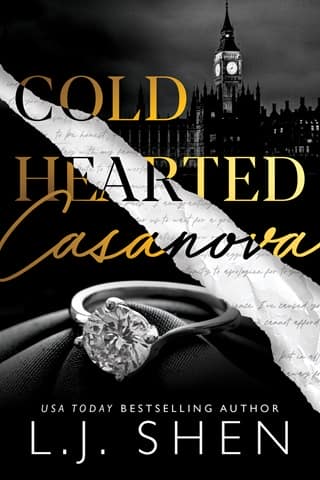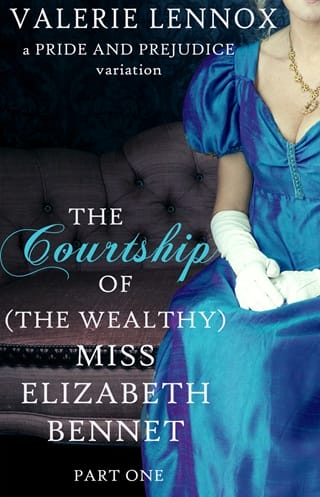Chapter Eleven Mattie
ELEVEN : MATTIE
DELANEY HORSE FARM
AUGUST 1965
I felt sick to my stomach as I lay on my bed, not caring if my party dress turned into a wrinkled mess. Laughter and music drifted from downstairs, where a group of our friends from school gathered to wish Mark and Nash well before they left for Vietnam in the morning. Two of their football buddies were also headed overseas, so it was a send-off for them too. We'd have a private family dinner later tonight—Mama'd spent the past two days preparing Mark's favorite dishes—before we had to say goodbye.
The whole thing disgusted me.
I folded my arms across my belly.
How could they be in a celebratory mood when my brother and his best friend were trading peace and safety for the frightening evil that awaited them in a place most Americans couldn't find on a map? We should be dressed in black, mourning the death of liberty and freedom, not wearing bright colors as though we had something to celebrate. I'd stayed downstairs as long as I could, a strained smile on my face the entire time before I feared I might erupt. I'd fled to my room to escape the insanity, but now I wished I'd run from the house, saddled Moonlight, and disappeared until everyone was gone.
Mama found me in a foul mood. She looked pretty, with her hair teased in the current fashion older women were wearing. She'd dabbed on lipstick and wore a dress that flattered her middle-aged figure. Who would know by looking at her that her son was leaving for war the next day?
"Mattie, what are you doing up here? Your brother was worried. They're starting a game of charades. You're always so good at it."
I shook my head in disbelief. "I don't understand how you and the others can act like everything is all right." I sat up, frustration swirling. "Mark is going away tomorrow, Mama. We may never see him again. Am I the only one who comprehends what could happen to him when he gets off that airplane in Vietnam?"
I was certain my angry voice carried to the living room below, but I didn't care who heard me. Every single person down there was either completely ignorant of what was happening in the war, or they simply didn't care.
Mama sat next to me and gave me a patient look. "Of course we know the dangers of Mark going to war, but some things are out of our control."
"Mark would have listened if you'd told him not to join the Marines," I insisted. "He would never go against your wishes."
She sighed. "Someday you'll find out for yourself that parents can't always protect their children. I remember when you were a tiny girl, not even three years old, and you were determined to ride a horse all by yourself. You didn't want Dad or me to ride with you. I promised to teach you to ride solo as soon as you were bigger, but that wasn't good enough for you. One day while I was busy in the house, your father hollered from the yard. I'd never heard that kind of fear in his voice. I rushed outside in time to see a horse galloping down the road, with you hanging on to its mane for dear life. We figured out later that you'd opened the gate and climbed up onto the fence. How you managed to mount the horse is still a mystery." She reached to grasp my hand. "You could have been killed."
"I fell off," I said, fuzzy memories of that long-ago day pushing forward in my mind.
"Thankfully you only had a sprained arm. After you stopped crying, you wanted right back on that horse. Nothing I said could convince you otherwise."
"That isn't the same thing as sending Mark off to war."
"In a way it is." She squeezed my fingers. "I learned that no matter how much I want to, I can't protect you and your brother every moment of your lives. There will be times when you make decisions I wish you wouldn't. Do things that could put you in harm's way. If it were up to me, I'd keep the two of you right here on the farm with me and Dad forever, but I know I can't. That's where trust comes in. I've had to learn to trust that you're in God's hands, and that you'll make good choices according to the things we've taught you. I'll pray for Mark every single day, just as I'll be praying for you while you're in Nashville. But I have to let you both go."
"I'm just going to school, Mama. War is different. Every day there are stories in the paper about bombs and Vietcong and American soldiers dying."
"You forget that your father and I weren't much older than you when the war with Germany and Japan took place. We remember how it felt to read about the terrible things that were happening all around the world. We felt powerless then, and in some ways, we feel the same now."
"But Dad—"
She held up her hand. "This is Mark's last night at home for a while, Mattie. We want it to be a happy one. Put aside your arguments and come join your friends."
With little enthusiasm, I trudged downstairs. When I entered the living room, I found Rusty Shaw standing in the middle of the room, gesturing to the ceiling with his fist closed, while tippy-toeing in a circle like a clumsy ballerina. If my mood hadn't been so sour, I might have joined in the laughter with the others as they shouted guesses to his ridiculous clues.
I noticed Paula Allyn sat near the window, away from the group. Her attention was not on Rusty and his antics but was fastened on my brother where he perched on the edge of the sofa next to Nash. Each of them sported a military haircut—flat on top and shaved on the sides—which Mark proudly described as "high and tight, Marine style." I had to admit their heads did remind me of the lid on a jar, hence the nickname jarhead . Although neither wore a uniform, two months at boot camp had produced a confidence and bearing in them that hadn't been there before.
Paula looked up when I approached. Telltale redness around her eyes bore evidence that Mark's girlfriend had cried recently.
"You're not playing charades?" I asked, although the answer was obvious.
"I'm not really in the mood for games."
Her quiet answer told me she, too, felt the heaviness of Mark's leaving. I sat on the footstool beside the chair. "I know what you mean."
We watched the game for a while. Mark correctly guessed Rusty's charade—the movie Mary Poppins —which meant it was now his turn. With a wink at me and Paula, he took center stage and began even sillier antics than Rusty had performed. Everyone laughed and shouted their guesses, but Paula and I remained grim-faced in our misery.
"I thought he would ask me to marry him before he left."
Her whispered confession didn't surprise me. She and Mark had been sweethearts since junior high. I'd wondered myself if my brother would propose when he returned home from Parris Island last week. Although he hadn't shared his secrets with me lately, I knew he loved Paula.
"Maybe he will."
She shook her head. "He said he doesn't want me to feel obligated to wait for him, in case I meet someone while I'm at Auburn." Tears shimmered in her green eyes. "I told him I loved him and that I don't have any interest in dating anyone else, but he thinks it's best if we wait until his tour is over before we decide anything."
Poor girl.
I sent my brother a glare, although he wasn't looking at me. He was pretending to have a huge belly and kept putting something invisible on his head. I knew he was acting out his favorite song—"I'm Henry VIII, I Am" by Herman's Hermits, a band from England that was part of what people called the British Invasion, all started by the Beatles. The inane lyrics cracked Mark up every time it came on the radio, and he'd bust out singing at the top of his lungs. To his great dismay, he'd missed the group's performance of the song on The Ed Sullivan Show while he was in boot camp back in June.
"I'm scared, Mattie." Paula's fearful whisper drew my attention once again. "I'm scared war will change him, and he won't love me when he gets home."
Although Paula, Mark, and I had always been in the same classes all through school, she and I hung out with different friends. She'd been a cheerleader, Miss Tullahoma High, and was voted "Friendliest" girl. I, on the other hand, was secretary for the senior class student council and held a spot on the debate team, a place where I'd honed my arguments against the war over the past year. Ms. Medlin, our sponsor, didn't always agree with me, but she respected my opinions.
I reached for Paula's hand. "Mark loves you. That isn't going to change, no matter what. But I see his point. He might be gone for a long time. You may change your mind."
She shook her head. "I won't. There's no one else for me but Mark."
I offered a supportive smile. "Then think how happy the two of you will be when he finally comes home."
A burst of laughter came from the group when Mark, Nash, and Rusty began prancing about and singing "I'm Henry VIII, I Am" in outrageous British accents. Mark sashayed over and grabbed Paula's hand.
"Dance with me," he hollered over the din, grinning.
Paula's expression instantly changed, from sheer agony to sheer joy, and she eagerly joined in the silliness. I couldn't help but smile, despite my frustration. My brother was a nutcase, but oh, how I loved him.
After everyone was gone, we enjoyed Mama's dinner. Her face shone with pleasure when Mark confessed he was going to miss her home-cooked food. When the meal was over, Mama asked Mark to change into his military uniform so Dad could take his picture. I couldn't believe the transformation when he came out of his room. He looked so mature and handsome. Mama had tears in her eyes as we each took turns standing next to Mark while someone snapped a photograph with Dad's old Kodak Brownie.
Mama shooed us onto the porch once he changed back into street clothes. I guess she knew Mark and I needed some alone time, so we sat on the porch swing, with him gently rocking the wooden bench with his foot. The silence between us wasn't heavy, but there were things I wanted to say before he left tomorrow.
"I know it's too late for you to change your mind about going to Vietnam." My throat thickened with fear. "But promise me you won't do anything stupid, like get yourself shot."
He put his arm around my shoulders. "I promise I won't do anything stupid, Sis." He tucked me into his side, and I rested my head on his shoulder. "But I need you to understand this is something I feel I'm supposed to do. Like a calling, of sorts."
I jerked out of his embrace and leveled a hard look at him. "People aren't called to war, Mark. They go because some politician or dictator, sitting safely in a fancy office somewhere, decided war was a better option than working things out without bloodshed."
His brow tugged. "That isn't always true, Mattie. Think of King David in the Bible. Taking lives wasn't something he wanted to do, but there are times when war is necessary. I'm not anxious to shoot at someone, but there are innocent people in South Vietnam who need help. I'm proud to be one of the Americans willing to offer it any way I can."
I wanted to argue with him, to tell him he was wrong, but I couldn't. His conviction had never wavered, and I had to admit it was admirable. I just wished he hadn't landed on the wrong side of the debate. Hadn't gone off and joined the Marines.
Hadn't felt it was okay to leave me behind.
I closed my eyes for a long moment. When my gaze met his again, I saw my brother, my twin. My wombmate. The person who knew me better than anyone and still loved me unconditionally. He'd borne my anger, my arguments, my disdain for his decision, yet he'd never fought back. He'd remained steady and kind, the same Mark I'd always known.
My chin trembled and tears filled my eyes.
"I'm proud of you, Mark," I said, my voice wobbly. "I really am. I don't agree with you, and I think it's a huge mistake for you to go to Vietnam, but I'll always love you."
"I love you too, little sis." Moisture shone in his eyes. "Promise me you won't do anything stupid while you're in Nashville, like joining the protests and getting yourself arrested."
I chuckled. "You know me too well."
He reached beside him and picked up a small book. I recognized it as the one Pastor Arnold had given him for graduation.
"The guy who wrote this, Dietrich Bonhoeffer, stood up for his beliefs back in World War II." He ran his hand over the title printed on the cover. The Cost of Discipleship. "Dr. Bonhoeffer was a German pastor, and he strongly disagreed with Hitler's regime. He was willing to risk his life to do what was right."
"How could a pastor fight for his beliefs yet join Hitler's army?"
"He didn't join the army. He wasn't a soldier. At least not the kind you're thinking of. He fought the lies being told to the German people by speaking truth. He was called to spread the gospel in a time and place where it wasn't welcome. And he made a lot of enemies doing so, including Hitler."
"He sounds like someone I would like to meet."
I thought my little joke would make Mark smile, but he didn't.
"Unfortunately, that isn't possible. He was arrested in 1943 and was eventually murdered in one of Hitler's concentration camps just before the allies liberated it."
This revelation stunned me. "How awful."
"The thing is, he'd come to America to teach. He could've stayed here, safe from Hitler and the Nazis, but Bonhoeffer chose to return to Germany."
"Why?" I asked. "Who would choose to live under a government run by a murderous tyrant when they could stay in the Land of the Free?"
"A man who felt called to minister to his countrymen. He knew they needed help. He once told a friend that if he'd stayed in America and didn't suffer the trials of war along with the rest of Germany, then he would have no right to participate in the reconstruction of Christianity when the war was over."
I recognized the point Mark wanted to make. "If you're trying to be a modern-day Bonhoeffer, there are better ways to do it than going to Vietnam. You're going as a soldier carrying a gun, not a preacher carrying a Bible."
"Can't I be both?"
His question startled me. "I've never heard you mention anything about being a preacher. It's always been football, football, football. You wanted to play and then coach."
He gave a slight shrug. "I still love football, and maybe I'll coach someday, but right now, I'm a soldier. That doesn't mean I can't share the gospel with people though. Pastor Arnold once said we don't need to go to seminary to talk to others about Jesus. The disciples were regular guys—fishermen, mostly—and they went out and changed the world by spreading the Good News. I figure I'm a pretty regular guy too. I want God to use me, like he used them, if he's willing."
I suddenly felt ashamed of the hard time I'd given him since he joined the Marines. "I guess I can't argue with that."
He handed the book to me. "I want you to keep this while I'm gone. I think you'll like it." He grinned. "You wanna know something else I have in common with Dietrich Bonhoeffer?"
"What?"
"He had a twin sister. Her name was Sabine."
"Really? What happened to her?"
"Her husband was Jewish, so they escaped to England with their children once Hitler came into power."
I studied the cover of the book. "I wonder what Sabine thought about Dietrich putting himself in harm's way, especially after he died because of it." I looked up. "There isn't anything wrong with safety, you know. People can still speak up for what's right without putting themselves in danger."
"I know." He took my hand and locked fingers with me. "But sometimes, someone has to do the hard things and make sacrifices to make sure the people they care about are safe."
Later, when the house was dark and still, I lay in bed, thinking about what he'd said. I knew on a certain level he was right. For centuries, men and women had fought for what they believed in. Freedom, religious rights, family. But Mark's going to Vietnam was different. There was no fear of that country's communistic government taking over the world the way people feared Hitler and the Japanese Empire would during World War II. I knew China was allied with the Vietcong, and that President Johnson was adamant in his support of the South Vietnamese, but I didn't agree with him regarding the use of American servicemen like Mark to police the tiny country.
Why couldn't Mark see that I was right this time?
I must've fallen asleep sometime in the wee hours of morning because I woke to the smell of fried bacon. A glance at my wristwatch told me it was a little before seven. Mark needed to be at the bus station at nine.
Tears rolled down my cheeks into my hair.
This was really happening.
My brother—my twin, my other half—was leaving to go to the opposite side of the world. We wouldn't see him for a year or more. I recalled what Paula said last night about the possibility of Mark being different when he returned from war. Would her worries come true?
By the time I made my way downstairs, Mama, Mark, and Dad had finished eating and were sitting at the table, drinking coffee, and talking about a horse Dad wanted to sell.
"Good morning, Miss Sunshine," Mark said with a grin. It was his usual greeting, especially on school mornings when he'd be up and dressed and ready to go before I even dragged myself out of bed.
Mama stood. "Do you want some breakfast, Mattie? There's time before we need to leave for town."
My stomach was in knots. The thought of food made me nauseous. "No, thanks."
She gave me an empathetic nod.
The next hour flew by, with Mama making sure Mark took this item or that. Dad didn't go out to the barn after breakfast, as was his custom, but stayed in the kitchen, a solemn look on his face. I was still frustrated with him, but it was too late for arguments.
By eight thirty, we were loaded into Dad's pickup truck. Mark sat on his big green duffel bag in the bed, with his back up against the window. Mama sat in the middle, which allowed me to watch Mark rather than the passing scenery.
Was he going to miss me as much as I would miss him? We'd never been separated for very long. Since the beginning of our existence, we'd been together nearly every day. What would I do without him?
Too soon, we arrived at the bus station. Nash stood outside the terminal building, a duffel bag identical to Mark's at his feet. Neither his mom nor his dad was with him.
We piled out of the truck. Dad went inside to the ticket counter and came back with a one-way ticket to Atlanta. He didn't smile when he handed the ticket to Mark, and I wondered if he might finally regret Mark's decision and his role in it.
Paula and Pastor Arnold joined us as we waited. Pastor offered a prayer for Mark and Nash just as a bus rolled into the terminal, spewing black exhaust into the warm morning air.
Nash thanked my parents for everything they'd done for him through the years. Dad shook his hand and Mama gave him a motherly hug.
When he faced me, he said, "Take care of yourself, Mattie."
"You too."
Then it was time to say goodbye to Mark.
As he folded me into a fierce embrace, I couldn't stop the tears. "I love you, Mark," I whispered. "Please come home."
"I love you, too, Sis. Write to me, okay?" he said, his voice choked with emotion.
I could barely watch as he hugged our parents, then kissed Paula goodbye as tears streamed down her cheeks.
He boarded the bus with one last wave.
The driver closed the door, put the big vehicle into gear, and carried away the most important person in my world.
I knew life would never be the same again.
 Fullepub
Fullepub 